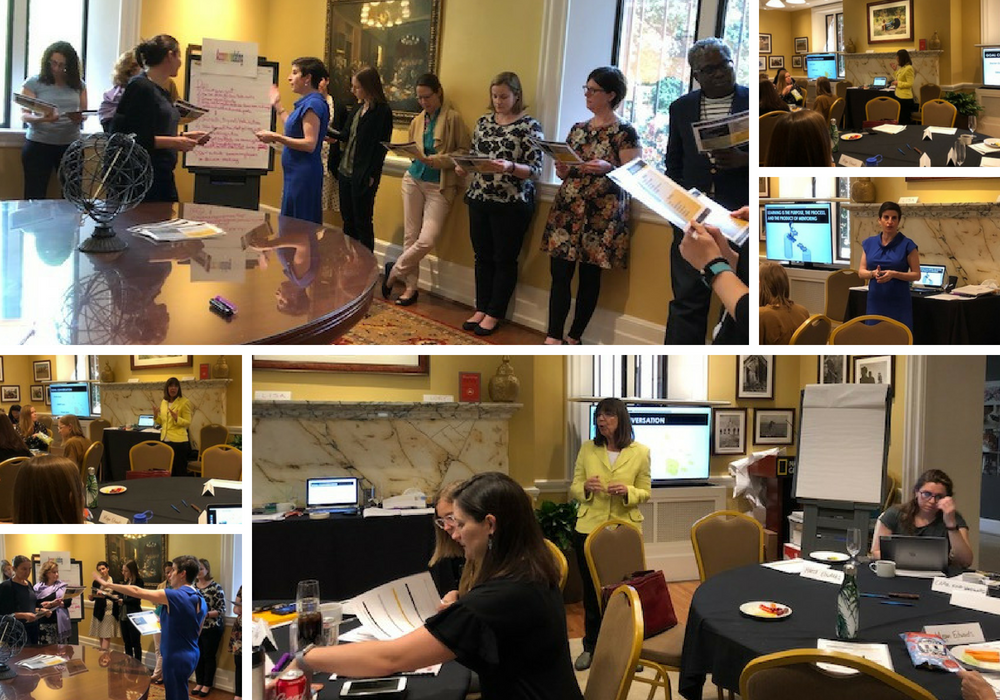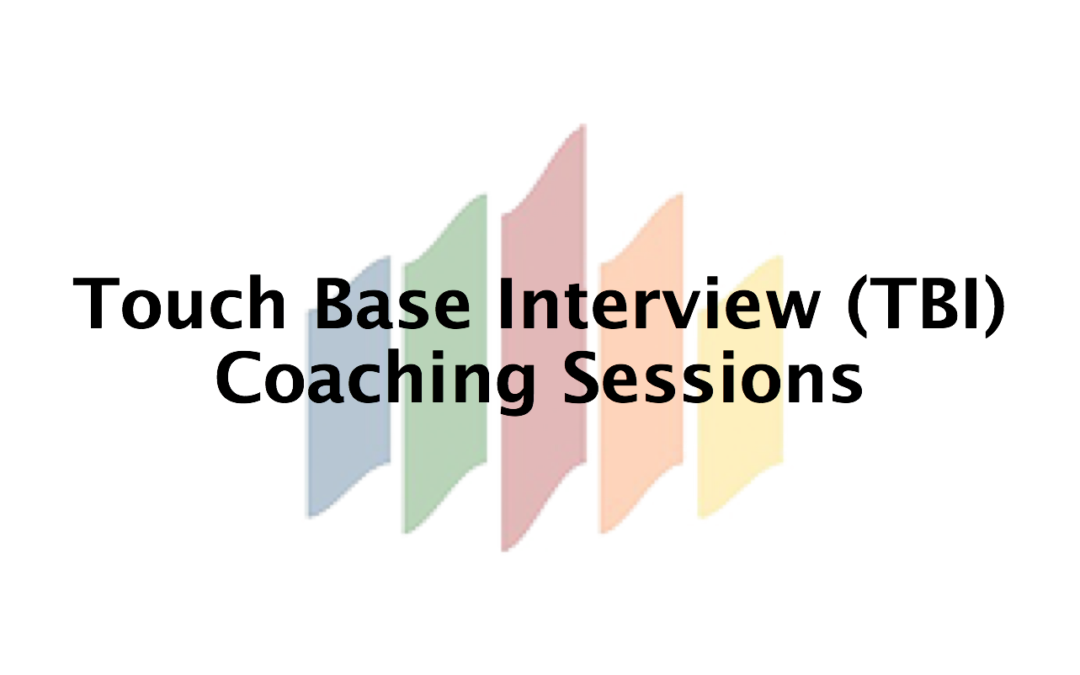Mentoring Training at National Geographic

Lisa Fain and Lory Fischler facilitate Mentoring training at National Geographic in Washington, DC on May 2, 2018

Lisa Fain and Lory Fischler facilitate Mentoring training at National Geographic in Washington, DC on May 2, 2018

The Center for Mentoring Excellence has conducted more than 200 interviews with mentors and mentees in formal mentoring programs around the globe using a process we created called Touch Base Interview (TBI) Coaching Sessions™. These coaching sessions offer mentors and mentees confidential, just-in-time coaching and support at critical milestones in the mentoring cycle. This works to ensure mentoring success by helping mentoring partners stay on track, grow and develop. (more…)

When we wrote Starting Strong, our primary goal was to help people understand what really good mentoring conversation looked like in practice. Second, we wanted to address some very basic (and commonly asked) questions: How do the individuals who are engaged in mentoring experience the relationship? What do they think about? What do they talk about? What conversations should they engage in to build their relationship and facilitate the learning process?
Starting Strong is a combination of two books in one – a mentoring fable and a conversation playbook. The fable presents an in-depth look at the dynamics and conversations inherent in a mentoring relationship when it is first starting out. The characters in the fable represent a composite of real life mentoring issues, struggles, and challenges. The conversation play book contains a set of tools to guide the reader’s mentoring conversations.
We had hoped that Starting Strong would provide a reference, a resource, and case study scenario. However, it wasn’t until recently that we discovered just how powerful it was as a training tool for raising the level of trust, deepening the relationship and keeping mentoring pairs on track.
Starting Strong enabled mentoring partners to build trust quickly because it created a shared language and understanding right from the start.
Starting Strong provided a roadmap for keeping relationships on track. As a result, new mentoring partners were more confident because they knew what to expect and they had the tools and strategies they needed to guide them.
Starting Strong gave experienced mentors new insights that allowed them to recognize what was missing in past mentoring relationships and better understand why they went off course.
Starting Strong provided a context for the training so that participants had a mental picture of what good mentoring looked like.
Starting Strong increased mentee understanding about the purpose of mentoring and their role in driving their own development.
Starting Strong gave mentees a better understanding about the role of their mentor in helping help them tackle their issues – without solving the problem for them.
Each participant was sent a copy Starting Strong prior to the initial mentoring training and asked to think about specific questions prior to the initial training.
We found that reading Starting Strong made a significant difference in the quality and depth of the mentoring conversations that took place during and after the mentoring training.
Our observations were validated by the participant comments five weeks following the training:
Ask participants to read Starting Strong prior to your next training event. It will kick start mentoring training and get mentoring pairs started on the right foot.
Here’s another question we often get about mentoring. Again, we hope it helps you in your own mentoring adventures.
Note: These questions are compiled from several questions we receive, and do not necessarily reflect any one person’s submission.
Q: I’ve been tasked by my HR VP to start a mentoring program to prepare our managers for new roles with greater responsibilities. Our VPs and senior leaders are the mentors and I’m supposed to put together a training session for them. I have never developed a training program before and I have never trained senior leaders. I’m shaking in my boots. Help!
A: Help is on the way! Your leadership has identified an important business imperative behind mentoring efforts, which is a great first step. Mentoring is not just a “feel-good” activity. It should address the strategic business goals of the organization. You need to ensure that your efforts and investments pay off. It can be overwhelming to create a dynamic mentor training program that is engaging, participative and informative.
An organization that identifies mentoring as a strategic tool must develop its in-house capacity for mentoring training. To be a truly effective mentor trainer, you have to develop some expertise in mentoring. We have a solution for you. Our Mentoring Facilitator Trainer Certification Program will prepare you to deliver Mentoring: Strategies for Success in your organization. The content of that program will ensure your mentor leaders:
Our training certification process will allow you to master the content and gain experience delivering the material to your audience. You will walk away after three days with all the tools, competencies and confidence you need to be successful.
And you’re in luck. Our next training event is coming up, Monday, September 29 – Wednesday, October 1. Registration is open now, but it fills up fast, so register today!
For more on why mentoring training is a must, see: https://www.centerformentoring.com/from-our-mailbox-3
People often ask us questions about mentoring or seek mentoring advice. We decided to answer a few of these questions on the blog this month. Hopefully their questions (and our answers) will shed some light on your own mentoring questions.
Note: These questions are compiled from several questions we receive, and do not necessarily reflect any one person’s submission.
Q: Six months ago, our mentoring program was announced. Everyone, and I mean everyone, was buzzing about it and our people were eager to get started. At first, there was a flurry of activity and everyone was meeting with their mentee and really pretty excited. But all that energy was short-lived. About six weeks in, our mentors started telling us they had run out of things to talk about. As it turns out, most of them were just having coffee and catching up. It seems like we’ve missed the boat somehow. What would you suggest?
A: What you are describing is the Three Cups of Coffee Syndrome. The mentor/mentee relationship has been established, but it lacks direction, focus or goals to move mentoring forward. This is what often happens when organizations launch a mentoring program without providing sufficient and consistent training for their mentors.
Good mentoring requires specific skill sets. Even leaders who engage in informal mentoring throughout their entire careers struggle with creating successful mentoring partnerships.
Mentoring training builds more confident and competent mentors. It promotes mentor readiness, creates a standard of mentoring practice, provides guidelines for ensuring mentoring success and offers a safe climate of support. Mentor training offers a roadmap and a benchmark for mentors to measure their success as well as strategies to address stumbling blocks quickly.
Good mentoring training saves time. It keeps mentoring interesting, productive and on track from the get-go.
If you’re interested in mentoring training, register for our 3-day training certification program. The Mentoring: Strategies for Success program will teach you how to lead your own one-day training for your organization. Our next program is Monday, September 29 – Wednesday, October 1. Seats are limited, so register today!